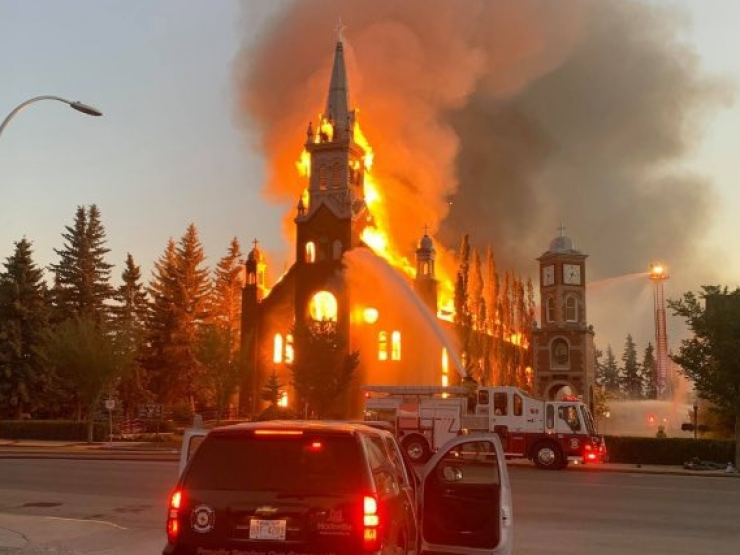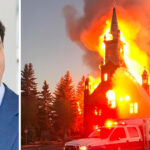Blog Post
What is coming next for Canadian churches?
By Jonathon Van Maren
Canada’s federal government is overtly hostile to orthodox Christians. Prime Minister Justin Trudeau has consistently accused those of holding Christian views on issues like abortion and sexuality of being fundamentally unCanadian; he has sought to deny government funding to summer jobs programs that will not overtly affirm his views on these issues; he has insisted that those who share the views of the vast majority of people throughout Canada’s history are hateful and bigoted. But when 68 churches were damaged or burned down in 2021 with a collective shrug and late-coming, muted protest from Canada’s progressives, it became glaringly obvious: apathy towards and disbelief in the religion of Canada’s founding has become overt hostility. Polling shows that an increasing number of Canadians believe that Christianity is damaging for society.
I have thought for some time that intolerance towards Christians in Canada is likely to grow. The vicious protests of the Toronto Public Library in 2019 were a wakeup call—activists raged outside the library for hours and even called for violence because an event featuring a pro-abortion, pro-gay feminist speaker named Megan Murphy had been allowed to proceed. Murphy agreed with progressives on everything—except for the idea that biological men identifying as women should be allowed into female-only spaces. For that, the mob bayed for her head. If they hate her that much, I wrote at the time, can you imagine how much they hate us? And furthermore: What stands between that mob and what they want? Our federal politicians? Provincial legislators? The courts?
The answer, of course, is almost nobody. Canada’s Conservatives, with a few notable exceptions, are eager to prove their loyalty to the LGBT movement and are unlikely to be reliable allies. (The “freedom candidate” Pierre Poilievre is a reliable vote for everything the LGBT movement asks for, including the “conversion therapy ban” that effectively bans some pastoral and parental conversations.) Canada’s media only pays attention to Christians when conflict with the LGBT movement or abortion industry erupts; post-Christian mainliners like Michael Coren are paid to write the same tired columns over and over again insisting that Christianity is akshually supportive of the sexual revolution and that 2,000 years of Christian teaching have gotten it all wrong.
Considering the fact that there are very few Canadians who still participate in religious worship and the overt hostility of those who control Canada’s institutions, what are the coming years likely to bring?
In a recent essay for First Things, Carl Trueman—one of our post-Christian era’s most trenchant observers–noted that Christian churches “face an unprecedented challenge” due to “the collapse of the broad moral vision that made them coherent entities.” The churches which have thus far escaped the wrath of the secular progressive elites, he noted, are those who have burned a pinch of incense (or, in many cases, several handfuls) and attempted to reconcile themselves to the new moral order by suddenly discovering that Christianity permits and endorses what it had previously called morally abominable.
It is important to note that we are just entering the post-Christian age—things are likely to get a lot worse. Trueman predicts that the chasm between the post-Christian churches and those that cling to Christian orthodoxies on life and sexuality is going to grow:
I would anticipate that within five years we will witness a significant disruption across all major representatives of the Christian faith. The fault lines will run between those who find a way to accommodate to the world’s terms of good citizenship and those whose fidelity to Christ will lead to varying degrees of internal exile within this earthly city. The former will ultimately accept the collapse of biblical anthropology, repudiating its implications for sexual morality, for human identity, and for addressing the various socially constructed problems we now face, such as those of race and gender. The latter will maintain Christian teaching and be decried as being at best naïve, at worst bigoted.
What does that mean in practical terms? It is impossible to know, of course. Christian commentators of all stripes have been arguing for several decades about the appropriate response to the rise of the secular Leviathan, with Rod Dreher famously arguing that all is lost and a strategic withdrawal (“the Benedict Option”) is our only chance of survival. But I do think that we can make a few reasonable predictions based on the direction Canada is headed, and that we would be wise to prepare for those eventualities.
First, Christian schools which receive government funding will likely be forced to either compromise on their convictions or forgo funding. Much of the Catholic school system has already gone this way—in Ontario, it is more controversial for a Catholic school not to fly LGBT flags than it is for them to do so. In Alberta more than twenty Christian schools would have faced a government shutdown if the New Democrats had won re-election. Christian schools in some provinces still receive government funding for the moment, but it is only a matter of time before that changes. We see this unfolding in the Netherlands, where there is relentless government (and activist) scrutiny surrounding teachings on LGBT issues and constant pressure to conform. Private Christian school education is already expensive in Canada. We should plan for that to get worse.
Second, it will become increasingly difficult for Christians to function in elite professions. This is already true for the medical profession, where practitioners are under increasing pressure to refer for assisted suicide, abortion, or birth control. Organizations such as the Abortion Rights Coalition of Canada (and others) constantly lobby for medical professionals who refuse to cooperate with acts that violate their conscience to be forced from the profession, and in the absence of a collective cultural understanding of conscience, there’s good reason to think that such efforts will be effective in persuading people of conscience to pursue other careers (or, as we’ve seen over the last couple of years, decamp to the United States). This is a shame because with the trickle of euthanasia horror stories turning into a torrent, we need principled medical professionals now more than ever.
Third, we will see an exodus from many churches as the cost of being Christian continues to rise (concurrent with the ongoing collapse of Canada’s mainline denominations–at current rates the Anglican Church will be out of members by 2040, and Michael Coren will have to shut off the lights). Even in conservative Christian circles, the rise of the digital age has mean that the upcoming generation has been largely catechized by the culture rather than the churches, and devices like the smartphone have given children from Christian homes the opportunity to participate in mainstream culture from early ages for the first time—just as mainstream culture has gone from post-Christian to anti-Christian. With the cultural influence of Christianity effectively dead and post-Christian culture offering young people the panoply of pornographic pleasures found in Pandora’s Box, many will find it simpler to walk away. Most universities are also institutions of indoctrination, and the peer pressure to abandon unpopular orthodoxies will continue to grow.
Fourth, churches and other religious institutions that refuse to bend the knee will likely lose their tax-exempt status at some point. Canadian LGBT activists have been making this case for years, and it is only a matter of time before the idea catches on or—more likely—a progressive politician decides that the time is right. I suspect that a key reason this has not yet been discussed is the awkward fact that many non-Christian institutions hold similar positions on marriage, sexuality, and abortion. That said, I have no doubt that a way to target churches specifically will be worked out. LGBT activists are already asking why the government is “rewarding bigotry” by awarding tax-exempt status to churches with a traditional view of sexuality, and LGBT activists have publicized sermons they disagree with as evidence of hatred. The churches and the state are on a collision course, and it isn’t hard to guess how this will end.
So what should we do? Carl Trueman offers some powerful advice in the aforementioned essay, including being deeply rooted in doctrine and Scripture; rejecting the postmodern worship practices that have come with our “childish age”; and putting “our own lives in perspective…before God.” We must work to defend our communities and shape the minds of our children while also seeking to love our neighbours. Canada is post-Christian, but Christians in Canada are thus far facing social and political marginalization rather than persecution. There will be a cost for Christian beliefs in the coming years, both social and financial. We should use this time to prepare for what may come–and what is likely to come.








